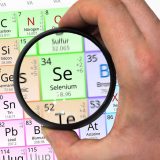

As the fourth most abundant mineral in the human body, magnesium is essential to good health. When magnesium levels are low, fatigue may result. When trying to determine the cause of persistent tiredness, even some physicians forget about the easy-to-remedy yet common problem of magnesium deficiency.
About Magnesium
Magnesium is needed for more than 300 biochemical reactions in the body including:
- Helps maintain normal muscle and nerve function
- Keeps heart rhythm steady
- Supports a healthy immune system
- Keeps bones strong
- Helps regulate blood sugar levels
- Promotes normal blood pressure
- Contributes to energy metabolism and protein synthesis
In our bodies, approximately 50 percent of total body magnesium is found in bone. The other half is mostly inside the cells of tissues and organs. While only one percent of magnesium is found in the blood, the body works very hard to keep blood levels of magnesium constant.
When it comes to energy metabolism, magnesium is crucial. Through a process known as cellular respiration, energy is produced in the body in the form of ATP (adenosine triphosphate). Magnesium is a vital co-factor in cellular respiration throughout every step of ATP creation. Carbohydrates, lipids and proteins cannot produce ATP without magnesium
Magnesium Deficiency
Diets of the industrialized world are known to be low in magnesium. According to a national USDA survey, 65 percent of Americans get less magnesium than is required for health. Refined grains and refined sugar are among the foods with the lowest magnesium content; thus people who consume lots of these foods often have a magnesium deficiency.
Published in the May 2002 issue of the Journal of Nutrition, a study by Agricultural Research Service physiologist Henry C. Lukaski and nutritionist Forrest H. Nielsen revealed important findings on the effects of depleted body magnesium levels on energy metabolism.
Lukaski and Nielsen demonstrated that inadequate magnesium is associated with a need for increased oxygen during exercise. They found that during moderate activity, those with low magnesium levels in muscle are likely to use more energy – and therefore to tire more quickly – than those with adequate levels. Regarding their study, Lukaski said, “When the volunteers were low in magnesium, they needed more energy and more oxygen to do low-level activities than when they were in adequate-magnesium status.”
Besides fatigue, signs of magnesium deficiency include:
- loss of appetite
- nausea
- vomiting
- weakness
As magnesium deficiency worsens, more serious effects emerge such as:
- numbness
- tingling
- muscle contractions and cramps
- seizures
- personality changes
- abnormal heart rhythm
- coronary spasms
Since many symptoms of magnesium deficiency are general and could mimic a host of other medical conditions, consultation with a physician is necessary.
Boosting Magnesium
If magnesium deficiency is confirmed, there are several approaches to increase this mineral in our body; namely, supplements, water and food.
- Magnesium supplements may be useful, but should not be taken by anyone with kidney disease.
- Typically rich in magnesium, consuming hard water is associated with many health benefits.
- Many foods are rich in magnesium, but some of the best sources include green vegetables, halibut, almonds, cashews and spinach.
Every person with fatigue does not necessarily have a magnesium deficiency. However, if you and your physician have ruled out other causative factors, your symptoms contain several typical of magnesium deficiency, and if you tire easily with physical activity, boosting your body’s magnesium levels could prove beneficial. Especially if refined sugar and flour dominate your diet, drinking hard water, taking supplements and increasing your consumption of magnesium-rich foods may help protect your body from fatigue.




